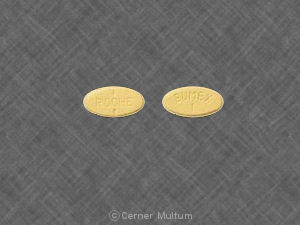Bumex (oral/injection)
Generic name: bumetanide (oral/injection) [ byoo-MET-a-nide ]
Other brand names of bumetanide (oral/injection) include: Bumex oral/injection
Drug class: Loop diuretics
What is Bumex?
Bumex is diuretic that is used to treat fluid retention (edema) in people with congestive heart failure, liver disease, or a kidney disorder such as nephrotic syndrome.
Bumex may also be used for purposes not listed in this medication guide.
What are the possible side effects of Bumex
Get emergency medical help if you have signs of an allergic reaction: hives; difficult breathing; swelling of your face, lips, tongue, or throat.
Bumex may cause serious side effects. Call your doctor at once if you have:
-
hearing problems;
-
confusion, hallucinations, problems with thought or memory;
-
trouble speaking or understanding what is said to you;
-
unusual weakness;
-
twitching, or a seizure;
-
weak or shallow breathing;
-
easy bruising, unusual bleeding, purple or red spots under your skin;
-
low magnesium--dizziness, irregular heartbeats, feeling jittery, muscle cramps, muscle spasms, cough or choking feeling;
-
low potassium level--leg cramps, constipation, irregular heartbeats, fluttering in your chest, increased thirst or urination, numbness or tingling, muscle weakness or limp feeling; or
-
dehydration symptoms--feeling very thirsty or hot, being unable to urinate, heavy sweating, or hot and dry skin.
Common side effects of Bumex may include:
-
muscle cramps;
-
dizziness;
-
low blood presure;
-
nausea; or
-
headache.
This is not a complete list of side effects and others may occur. Call your doctor for medical advice about side effects. You may report side effects to FDA at 1-800-FDA-1088.
Related/similar drugs
Warnings
You should not use Bumex if you are unable to urinate, if you have severe kidney or liver disease, if you are severely dehydrated, or if you have an electrolyte imbalance (low potassium or magnesium).
Before taking this medicine
You should not use Bumex if you are allergic to it, or if you have:
-
severe kidney disease or are unable to urinate;
-
severe liver disease or cirrhosis;
-
severe dehydration; or
-
an electrolyte imbalance (such as low levels of potassium or magnesium in your blood).
Tell your doctor if you have ever had:
-
a heart rhythm disorder;
-
liver disease;
-
kidney disease (or if you are on dialysis);
-
gout;
-
an allergy to sulfa drugs; or
-
if you are on a low-salt diet.
Tell your doctor if you are pregnant or breast-feeding.
Bumex is not approved for use by anyone younger than 18 years old.
How should I take Bumex?
Follow all directions on your prescription label and read all medication guides or instruction sheets. Your doctor may occasionally change your dose. Use the medicine exactly as directed.
Bumex injection is injected into a muscle, or given as an infusion into a vein. A healthcare provider will give you this injection if you are unable to take the medicine by mouth.
Bumex will make you urinate more often and you may get dehydrated easily. Follow your doctor's instructions about taking potassium supplements or getting enough salt and potassium in your diet.
Call your doctor if you are sick with vomiting or diarrhea, or if you are sweating more than usual. You can easily become dehydrated while taking Bumex. This can lead to very low blood pressure, a serious electrolyte imbalance, or kidney failure.
You will need frequent medical tests.
Store at room temperature away from heat, moisture, and light.
What happens if I miss a dose?
Bumex is sometimes used only once, so you may not be on a dosing schedule. If you are on a dosing schedule, take the medicine as soon as you can, but skip the missed dose if it is almost time for your next dose. Do not take two doses at one time.
What happens if I overdose?
Seek emergency medical attention or call the Poison Help line at 1-800-222-1222.
Overdose symptoms may include extreme dizziness or weakness, confusion, loss of appetite, stomach cramps, and vomiting.
What should I avoid while taking Bumex?
Avoid becoming dehydrated. Follow your doctor's instructions about the type and amount of liquids you should drink while you are taking Bumex.
What other drugs will affect Bumex?
Bumex can harm your kidneys, especially if you also use certain medicines for infections, cancer, osteoporosis, organ transplant rejection, bowel disorders, high blood pressure, or pain or arthritis (including Advil, Motrin, and Aleve).
Tell your doctor about all your other medicines, especially:
-
lithium;
-
digoxin;
-
blood pressure medication; or
-
any other diuretic.
This list is not complete. Other drugs may affect Bumex, including prescription and over-the-counter medicines, vitamins, and herbal products. Not all possible drug interactions are listed here.
Frequently asked questions
More about Bumex (bumetanide)
- Check interactions
- Compare alternatives
- Reviews (11)
- Drug images
- Side effects
- Dosage information
- During pregnancy
- Generic availability
- Drug class: loop diuretics
- Breastfeeding
Patient resources
Other brands
Professional resources
Related treatment guides
Further information
Remember, keep this and all other medicines out of the reach of children, never share your medicines with others, and use this medication only for the indication prescribed.
Always consult your healthcare provider to ensure the information displayed on this page applies to your personal circumstances.
Copyright 1996-2025 Cerner Multum, Inc. Version: 9.01.

